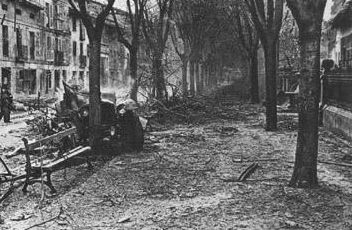The bombings of Durango and Gernika
Luistxo Fernandez
2007/04/02 11:02
This weekend was the 70th aniversary of the bombardment of Durango, March 31st, 1937. By some accounts, it was the first time in Europe when the aerial bombardment of civilian urban areas was carried. It was Italian bombers which carried the attack, under the command of Spanish generals Francisco Franco and Emilio Mola.

Some 300 people died in Durango that morning. My father survived, without injuries, surrounded by debris, in the middle of Ezkurdi square, right here. Then a teenager, now he's 85 years old, and he's quite well at his age, he remains an avid reader of history books. Memory and history have retained the name of Guernica (Gernika), the city destroyed by a similar bombing some weeks later (april 26th), although the number of mortal victims was probable lower in Gernika than in Durango. However, not just italians, but Nazi germans of the Condor Legion of the Luftwaffe took part on that attack, and the physical destruction of the city was bigger.
Germany has apologized for Gernika. I haven't heard a word from the army of Mola and Franco, the Spanish army.
Ten years ago, I was a journalist for Basque newspaper Euskaldunon Egunkaria, and I wrote (together with Basque historian Josu Chueca) a report about Durango, using, among others, the direct account of my father (I showed little modesty, you see). That series of reports about the Spanish Civil War in the Basque Country was converted into a book by Egunkaria. Then, in 2004, Spanish judges closed Egunkaria: the material written content of that newspaper, including my half-book, remain hijacked by the judge. No, that's not Turkey, it's the European Union, basque newspapers are closed under unproved accusations of terrorism, it's former directors were tortured... Three years later, not a single evidence of links to terrorism have surfaced anywhere.
The perpetrators of Durango's and Gernika's bombings still have streets named after them in Spain.
Great and well documented Flash reconstruction here: the criminal Bizkaia campaign carried by fascist forces in the spring of 1937, one of the darkest moments of the Spanish Civil war.

Some 300 people died in Durango that morning. My father survived, without injuries, surrounded by debris, in the middle of Ezkurdi square, right here. Then a teenager, now he's 85 years old, and he's quite well at his age, he remains an avid reader of history books. Memory and history have retained the name of Guernica (Gernika), the city destroyed by a similar bombing some weeks later (april 26th), although the number of mortal victims was probable lower in Gernika than in Durango. However, not just italians, but Nazi germans of the Condor Legion of the Luftwaffe took part on that attack, and the physical destruction of the city was bigger.
Germany has apologized for Gernika. I haven't heard a word from the army of Mola and Franco, the Spanish army.
Ten years ago, I was a journalist for Basque newspaper Euskaldunon Egunkaria, and I wrote (together with Basque historian Josu Chueca) a report about Durango, using, among others, the direct account of my father (I showed little modesty, you see). That series of reports about the Spanish Civil War in the Basque Country was converted into a book by Egunkaria. Then, in 2004, Spanish judges closed Egunkaria: the material written content of that newspaper, including my half-book, remain hijacked by the judge. No, that's not Turkey, it's the European Union, basque newspapers are closed under unproved accusations of terrorism, it's former directors were tortured... Three years later, not a single evidence of links to terrorism have surfaced anywhere.
The perpetrators of Durango's and Gernika's bombings still have streets named after them in Spain.
Great and well documented Flash reconstruction here: the criminal Bizkaia campaign carried by fascist forces in the spring of 1937, one of the darkest moments of the Spanish Civil war.
